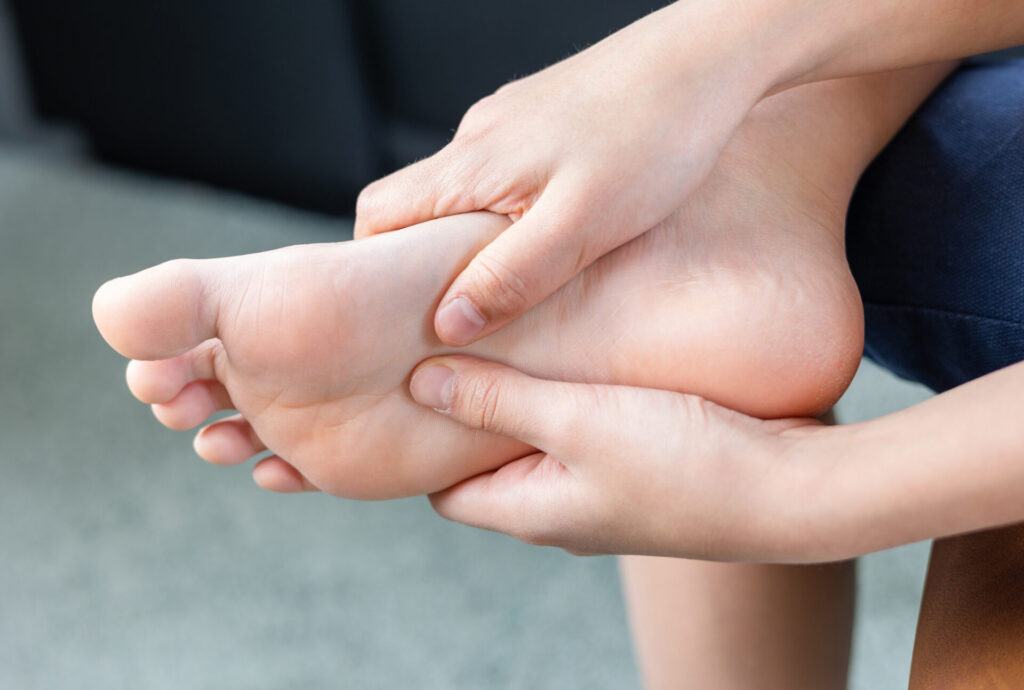What is Morton's Neuroma?
Morton’s neuroma is a condition that affects the ball of your foot, typically the area between your third and fourth toes. The second and third toes can also be affected. Morton’s neuroma may feel as if you are standing on a pebble in your shoe.
It happens when the nerves in the foot become irritated and thickened, causing pain. You may experience symptoms in one foot or both.
You may experience Morton’s Neuroma at any age and at any time. However, symptoms are more common if you wear high heels or ill-fitted shoes placing extra pressure on your foot, if you play high-impact athletic activities such as jogging or running, or if you already live with foot deformities such as bunions, hammertoes, high arches or flat feet.
Morton’s neuroma can be reliably diagnosed by taking a history of your condition and by doing a physical examination. One of the main symptoms is pain when squeezing the foot (compressing the neuroma). There may also be a click when squeezing the foot.
Your consultant may wish to perform an ultrasound or MRI scan to confirm your diagnosis.

Ready to book now? Get in touch to discuss your needs and decide on the best course of treatment for you.
Ready to book now? Get in touch to discuss your needs and decide on the best course of treatment for you.
What happens during Morton's Neuroma excision?
If your pain is severe or other treatments have not worked, you may be offered a Morton’s Neuroma excision. This surgical treatment involves removing some of the tissue surrounding the affected nerve, or removing part of the nerve itself.
The operation can be carried out under local anaesthetic, sedation or general anaesthetic. During the procedure an incision will be made on your foot to allow your surgeon to access to the affected nerve. It is a relatively short procedure, typically taking between 30 and 60 minutes.
You will usually go home on the same day.
Preparing for your Morton's Neuroma surgery
Your surgeon will give you simple preparation advice to help you get ready for your operation. If having general anaesthetic, you will undergo a few medical checks prior to your surgery date.
You may be advised to stop taking medications a few days before surgery, particularly if you take aspirin or other blood-thinning drugs. If you smoke, you may be advised to stop. This is because smoking increases your chances of getting a wound infection, which can slow down your recovery after surgery.
It is advised that you prepare your home and living arrangements for your return from hospital. We strongly recommend that you avoid public transport after your procedure, so please prepare a taxi or arrange an escort to take you home from the procedure. You will not be able to drive at least on the day of the procedure. You must avoid trauma to the surgery site following the procedure so please plan your work and activities accordingly.
Recovering from Morton's Neuroma surgery
Your surgeon will typically use absorbable stitches where possible, so you may not need to have stitches removed. In the first day and night after surgery, you will need a competent adult with you to keep you safe.
You will likely experience discomfort during the first few days but you will be given painkillers to help. For the first 2 to 4 days, you will need to completely rest. You will be able to stand and take weight using crutches but you must rest with your feet up as much as possible.
One week after surgery, you will need to attend the clinic for your foot to be checked and re-dressed. At this point you’ll be able to do a little more, and pain is a sign that you are doing too much.
At two weeks, you will need to attend again for a check-up. At this point you may be able to return to wearing shoes, however this may take longer, up to around 6 to 8 weeks.
Each patient’s recovery time will differ. Generally speaking, you’ll be able to return to non-manual work after 2 to 4 weeks and manual work in 4 to 6 weeks. Sport can be considered approximately 3 months after surgery.
Complications and side effects
Your consultant will discuss the risks and benefits of this surgery to help you make an informed decision.
Complications may include:
- A thickened or tender scar which may reduce over 12 months
- Areas of numbness which may reduce over 12 months
- Regrowth of nerve from the area treated which may require further treatment
- Entrapment of the nerve stump within scar tissue. This requires steroid injection therapy or a further operation
- Circulation disturbance to the adjacent toes.
What are the alternatives to Morton's Neuroma surgery
This surgery will only be recommended if other treatments have not worked or your case is severe. Alternative treatment methods can include: altering activity levels, using painkillers or changing footwear to wear extra-width or special footwear, possibly with an in-shoe foot support. Steroid injection therapy and surgical decompression are further options.
Cost
Please call us to discuss pricing at your local clinic.
-
Bunion surgery £4,419.00

